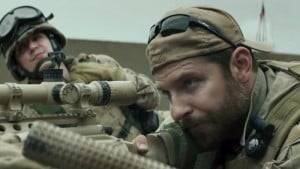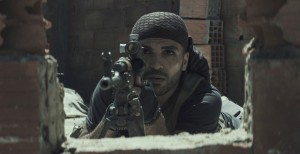
(Non-spoiler alert: This review is free of major spoilers. The less you know about Chris Kyle’s life story prior to seeing this film, the richer your viewing experience will be.)
What a strange year for Oscar! With American Sniper, we now have three fact-based movies nominated for Best Picture whose relationship to verifiable truth is problematic. However, compared to the other two – The Theory of Everything and The Imitation Game – the difficulties are less substantial for American Sniper.
With The Theory of Everything, Stephen Hawking’s life was whitewashed free of the nastier bits to fashion a secular saint. As for The Imitation Game, the more pages I read of Alan Turing’s definitive biography, the more fictional Benedict Cumberbatch’s character becomes.
Clint Eastwood’s film is drawn from Chris Kyle’s autobiography of the same name, recounting his service as a Navy SEAL. During his time in Iraq, Kyle notched the most confirmed sniper kills in American military history.
Fortunately for Eastwood’s film and for us viewers, it appears that Kyle was primarily veracity-impaired when it came to his civilian life. Based on reliable journalistic sources (again, I’d recommend perusing these links only after watching the movie), Kyle mainly suffered from Munchausen’s Syndrome when boasting of stateside exploits. The Pentagon continues to confirm Kyle’s count of 160 enemy kills. (Then again, I’d be remiss if I didn’t point out that the Pentagon also stuck to their fable of Pat Tillman’s valorous death in a hail of enemy gunfire until that tale became utterly untenable, so do with this information what you will.)
It’s a shame that I have to sandwich this review between so many caveats, for American Sniper is film-making of the highest order. After a brief opening sequence with Kyle on a Fallujah rooftop, a series of flashbacks reveal Kyle’s earlier life experiences: a Texas childhood in a milieu of churchgoing hypermasculinity and a directionless young adulthood until he joins the military. American Sniper then shows us Kyle’s harsh SEAL training, along with his whirlwind romance and marriage to Taya.
From here on, the movie proceeds in a linear fashion, following Kyle through his multiple deployments to Iraq and returns stateside to his growing family. Eastwood’s direction and Jason Hall’s screenplay admirably set up multiple tension-laden conflicts for Kyle, both internal and external.
In Iraq, Kyle tracks “The Butcher,” a sadistic enforcer with close ties to Al Qaeda leadership. His major combat adversary, however, is a fellow sniper named Mustafa. Both Kyle and Mustafa become legendary among friend and foe, but where Kyle possesses doorway-filling bulk, Mustafa is slender and agile, leaping across rooftops to escape American pursuers.

Eastwood and his crew have outdone themselves in showing us believable combat situations. I completely bought into their re-creation of Fallujah and Sadr City, with drones and helicopters swooping over battle-wrecked neighborhoods. American Sniper is tough to stomach at times, with realistic child deaths and bullet holes punching through chests and faces. As such, my greatest viewing caution extends not to children, but to war vets and their loved ones, for whom this movie could trigger strong psychological distress.
At home, Kyle struggles to maintain intimacy with Taya, given that his heart and mind remain with his endangered buddies still in Iraq. In playing Kyle’s wife, Sienna Miller gives an excellent performance as a caring spouse who still at times verges on calling it quits. However, Kyle’s greatest domestic conflict is with internal demons, as he progressively manifests signs of post-traumatic stress.

Since Bradley Cooper is only 40 years old, I hesitate to use the term “career-defining” for his portrayal of Chris Kyle. But this is most definitely Cooper’s strongest performance to date. I was fully convinced by his character’s battlefield passion and discipline (so intense that Kyle would rather piss himself and wallow in his own urine for hours, rather than relieve himself elsewhere and miss a golden sniping opportunity). Still more, his home demeanor resembles that which countless combat veterans and their spouses have described to me, an unstable mix of bland detachment, hypervigilance, and irritability.
I feel a similar reluctance to apply the “career-defining” descriptor to Clint Eastwood, because he’s inhabited so many iconic roles and directed numerous excellent movies. So let’s just say that American Sniper would be an apt culmination of his film craft. During 60 years in the movies, Eastwood has ambivalently explored motifs of violence, war, and American manhood. This wrestling continues with American Sniper and is powerfully summated here.
Unfortunately, extremist pundits now threaten to dominate the discussion of American Sniper and Chris Kyle’s life story in general. Left or right, it would be tragic if loudmouthed demagogues got the last word on American Sniper.
Sure, there’s ample wet dream material in this movie for those who worship the gun-toting, world-conquering American Jeebus derived from the Gospel According to Fox News. Frankly, Chris Kyle comes across in American Sniper as unreflective and dichotomous in his thought processes. He carries his Bible with him everywhere, but doesn’t hesitate to spout ugly words about the “savages” he’s killing, or when in Texas, to turn to beer rather than God for comfort.
But for freethinkers and those who attempt to follow the complicated Jesus of the Four Gospels, there’s deeper matter to ponder in Eastwood’s film. The decimated cities, the friendly locals who get punched around until they sufficiently demonstrate their bona fides, and the numberless casualties lead to tough moral questions about our involvement in Iraq. In American Sniper, a handful of soldiers and family members question this legitimacy, though Kyle dismisses such doubters as weak or deficient. Yet, these queries don’t go away during the course of this movie.
Almost as significantly, while giving us an uber-masculine archetype in Chris Kyle, Eastwood demands to know what truly comprises a good man. Is it bravado and quick-witted banter? Or does it have more to do with protecting your friends, loving your family, and looking after the wounded long after they’ve returned home? In addressing these questions, Eastwood has given us a film of integrity that refuses to pander to any demographic.
4.5 out of 5 stars
(Parents’ guide: American Sniper is appropriately rated R, considering its many hyperviolent scenes and frequent salty language. I would steer younger teens away from this. I also beseech combat veterans and their loved ones to use discernment in choosing whether to view this movie.)











